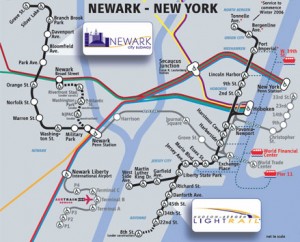New Jersey Future Blog
More New Jersey Commuters Relying on Transit to Get to Work
April 3rd, 2012 by Tim Evans
- The percent of New Jersey commuters (people not working at home) who ride transit to work increased between 2000 and 2010 — from 9.6 percent to 11.2 percent.
- While New Jersey’s total workforce has risen by 4.6 percent in this 10-year period, the number of transit commuters has increased by 20.9 percent.
- Nationally, New Jersey is second only to New York in the percentage of its commuters who ride transit.
Buses, Trains Gain in Popularity; Carpools Take a Back Seat
According to the American Community Survey’s 2010 one-year estimates, the growth between 2000 and 2010 in the number of transit commuters in New Jersey was roughly similar for bus (+21.8 percent) and rail (+17.9 percent). Bus commuters increased from 5.7 percent of all commuters in 2000 to 6.6 percent in 2010, while rail commuters increased their share of total commuters from 3.9 percent to 4.4 percent.
New York widened its lead over New Jersey, increasing its transit mode share from 24.3 percent to 27.8 percent — an increase of 3.5 percentage points, compared to 1.6 percentage points for New Jersey. But New Jersey, in turn, widened its lead over third-place Massachusetts, which increased its transit mode share by only 0.7 percentage points, from 8.8 percent in 2000 to 9.5 percent in 2010.
Interestingly, looking only at bus riders, New Jersey trails New York by a scant 1/10th of 1 percent (6.6 percent vs. 6.7 percent), and both states are bested by Hawaii, where 6.9 percent of commuters rode the bus in 2010.
The percent of commuters carpooling dropped in every single state between 2000 and 2010. Nationally, the carpooling rate decreased by 2.5 percentage points, from 12.6 percent to 10.1 percent. New Jersey’s decrease of 2.1 percentage points was smaller than the national rate, although its carpool rate in 2010 was below the national average at 8.7 percent.
New Jersey was one of only four states where the percent of commuters driving alone did not increase between 2000 and 2010. The single-occupancy vehicle (SOV) commute percentage actually fell by 1.4 percentage points in New York, from 58.1 percent to 56.7 percent, while decreasing by negligibly small amounts in New Jersey (remaining at 75.1 percent), South Dakota and Massachusetts. Nationally, the SOV percentage increased from 78.4 percent to 80.2 percent. New Jersey’s SOV commute percentage is fourth-lowest in the nation, after New York, Hawaii and Alaska. (If you’re wondering why SOV percentages are so low in Hawaii and Alaska, they rank first and second, respectively, in carpooling.)
Walking Fails to Keep Pace; Full Speed Ahead for Biking
The percent of people walking to work fell in New Jersey, from 3.2 percent in 2000 to 3.0 percent in 2010. The walking percent also fell nationally, and in 37 of the 50 states. Worse, the absolute number of people walking to work fell by 2.5 percent in New Jersey, while increasing by 1.0 percent nationally. The number of people walking also fell in 25 other states besides New Jersey.
Biking to work, on the other hand, was up almost everywhere. While still making up only a very small percentage of total commuters (0.6 percent nationally, up from 0.4 percent in 2000, and 0.4 percent in New Jersey, up from 0.2 percent), the bike mode share nevertheless increased in all but six states: Arizona, Delaware, Arkansas, New Hampshire, Mississippi and Louisiana. What’s more, the absolute number of people biking to work was up almost 50 percent nationally and increased everywhere except New Hampshire, Mississippi, Delaware and Arkansas.
Encouragingly, the number of bike commuters increased by 72.5 percent in New Jersey between 2000 and 2010.
Perhaps the most remarkable thing about these numbers is what they say about the strength of the transit network in New Jersey. Given that jobs within New Jersey have been decentralizing, a phenomenon that tends to work against both carpooling and transit, it is a testament to both the availability and the importance of buses and trains that the share of commuters who drive alone to work has not increased over the last decade. Buses and trains remain the preferred mode for commuters into New York City, which is still a huge employer of New Jersey residents. A renewed focus on the transit network by New Jersey state government, as represented by the Urban Transit Hub tax credit, should also enable more intra-New Jersey commuters to use transit in the future.
State agencies can also do more to exploit the power of public transportation by thinking more strategically about what kinds of development to promote in which parts of the transit network. New Jersey Future will soon release a research report focused on assets near transit hubs, intended to highlight where the greatest opportunities are; sign up here to be notified when the report is available.
A note on the source for these data: The American Community Survey replaces the Census’s long-form questionnaire, so these estimates are the first from 2010 that can be compared directly to the 2000 Census numbers. – T.E.


















When I began working for ShapingNJ at DHSS on State St. in 2009, I commuted by the 606 from the Princeton Shopping Center or Palmer Sq.to State St. The bus ride took about 15 minutes longer than driving but enabled me to get a little exercise walking or biking to the stops and was more relaxing than driving. I commuted happily by bus for about a year. Then one day (in my mind it was shortly after Christie’s election) the bus fares went up by about 40% and worse, the frequency of the buses during rush hour dropped. As a white collar worker, I could sustain the fare increase, but not the loss of frequency–to miss one bus at the end of the day meant I stood at the bus stop for up to 40 minutes. Within 3 days I was commuting by car. I still regret and resent this loss of service.